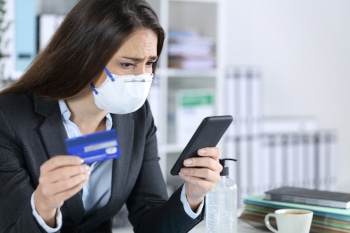
COVID-19 and Identity Theft
Call Us Today For Your Shredding Estimate
 In the shadow of the Coronavirus pandemic, Americans face an uncertain future. The crisis has forced many organizations to close their doors. But for identity thieves, it’s business as usual. COVID-19-related scams are proliferating as fraudsters capitalize on fear and uncertainty. In this blog, we identify several common scams and offer tips for protecting your information.
In the shadow of the Coronavirus pandemic, Americans face an uncertain future. The crisis has forced many organizations to close their doors. But for identity thieves, it’s business as usual. COVID-19-related scams are proliferating as fraudsters capitalize on fear and uncertainty. In this blog, we identify several common scams and offer tips for protecting your information.
Zoom Bombing
As more people and companies use Zoom to stay in touch, cybercriminals are exploiting security holes in the popular video conferencing app. It is not only Zoom that is vulnerable; hackers are attacking a variety of online video platforms. Take the following steps to keep your online meetings secure:
- Update the firmware and software on your device.
- Disable guest screen sharing.
- Keep your meeting IDs private.
- Require password logins and/or host authorization before attendees can enter the meeting.
- Use a virtual private network when video conferencing.
Following these precautions will allow you to stay in touch without compromising your identity.
Scam Phone Calls
Phone fraudsters are using the COVID-19 pandemic to peddle fake testing kits, vaccines and financial assistance offers. Never answer calls from numbers you do not recognize. Detecting fraudulent calls is not always easy, though. Scammers often “spoof,” or appear to be calling from legitimate numbers. Remember that government agencies and medical providers never initiate a call or text and then ask for personal information. When in doubt, hang up the phone or ignore the text and report the call to law enforcement.
Phishing Threats
Email phishing attacks are always a threat, but now hackers are distributing ransomware through email links and attachments claiming to be from the World Health Organization (WHO) or Centers for Disease Control (CDC). Never download files or click on links before verifying the sender’s email address. Regularly back up important documents and keep copies of your backup data in a secure location.
Mail Fraud
As more and more people have curtailed their in-store shopping habits and are relying on home deliveries, mail theft has skyrocketed. If you do not use a locking mailbox, collect your packages as soon as they arrive. Ask for delivery confirmation from your shipping provider.
As you can see, the COVID-19 crisis involves much more than protecting your health. We are committed to keeping you informed and safe.
For more identity theft prevention tips, please call us at (610) 692-TEAR (8327) or complete the form on this page.
Wiggins Shredding serves the Pennsylvania and the Tri-State Area of Maryland, Delaware and New Jersey. We are your trusted, locally-owned paper shredding resource!


